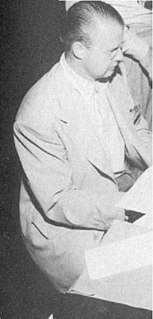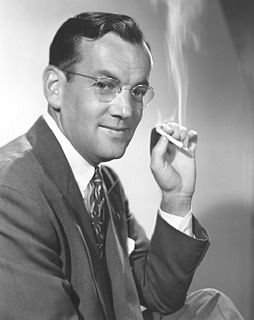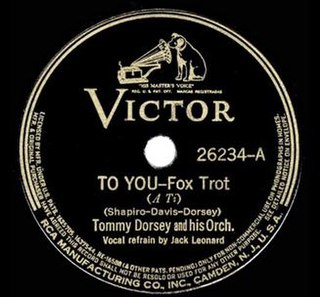
Alton Glenn Miller was an American big band trombonist, arranger, composer, and bandleader in the Swing era. He was the best-selling recording artist from 1939 to 1942, leading one of the best-known big bands. Miller's recordings include "In the Mood", "Moonlight Serenade", "Pennsylvania 6-5000", "Chattanooga Choo Choo", "A String of Pearls", "At Last", "(I've Got a Gal In) Kalamazoo", "American Patrol", "Tuxedo Junction", "Elmer's Tune", "Little Brown Jug", and "Anvil Chorus". In just four years, Miller scored 16 number-one records and 69 top-10 hits—more than Elvis Presley and the Beatles did in their careers.

Thomas Francis Dorsey Jr. was an American jazz trombonist, composer, conductor and bandleader of the big band era. He was known as the "Sentimental Gentleman of Swing" because of his smooth-toned trombone playing. His theme song was "I'm Getting Sentimental Over You". His technical skill on the trombone gave him renown among other musicians. He was the younger brother of bandleader Jimmy Dorsey. After Dorsey broke with his brother in the mid-1930s, he led an extremely successful band from the late 1930s into the 1950s. He is best remembered for standards such as "Opus One", "Song of India", "Marie", "On Treasure Island", and his biggest hit single, "I'll Never Smile Again".
Mitchell Parish was an American lyricist.

Glenn Miller and His Orchestra was an American swing dance band formed by Glenn Miller in 1938. Arranged around a clarinet and tenor saxophone playing melody, and three other saxophones playing harmony, the band became the most popular and commercially successful dance orchestra of the swing era and one of the greatest singles charting acts of the 20th century.

Gordon Lee "Tex" Beneke was an American saxophonist, singer, and bandleader. His career is a history of associations with bandleader Glenn Miller and former musicians and singers who worked with Miller. His band is also associated with the careers of Eydie Gormé, Henry Mancini and Ronnie Deauville. Beneke also solos on the recording the Glenn Miller Orchestra made of their popular song "In The Mood" and sings on another popular Glenn Miller recording, "Chattanooga Choo Choo". Jazz critic Will Friedwald considers Beneke to be one of the major blues singers who sang with the big bands of the early 1940s.

"It Happened in Sun Valley" is a 1941 song composed by Harry Warren, with lyrics by Mack Gordon. It was recorded and featured by Glenn Miller and his orchestra in the movie Sun Valley Serenade.

John Chalmers MacGregor, better known as Chummy MacGregor, a musician and composer, was the pianist in The Glenn Miller Orchestra from 1936 to 1942. He composed the songs "Moon Dreams", "It Must Be Jelly ", "I Sustain the Wings", "Doin' the Jive", "Sold American", "Cutesie Pie" in 1932 with Bing Crosby and Red Standex, and "Slumber Song".
Irving "Babe" Russin was an American tenor saxophone player.

"Moonlight Serenade" is an American swing ballad composed by Glenn Miller with subsequent lyrics by Mitchell Parish. It was an immediate phenomenon when released in May 1939 as an instrumental arrangement, though it had been adopted and performed as Miller's signature tune as early as 1938, even before it had been given the name "Moonlight Serenade." In 1991, Miller's recording of "Moonlight Serenade" was inducted into the Grammy Hall of Fame.

Ernesto Caceres was an American jazz saxophonist born in Rockport, Texas. He was a member of the Glenn Miller Orchestra from 1940–1942.

"Serenade in Blue" is a 1942 Big Band song composed by Harry Warren, with lyrics written by Mack Gordon. It was introduced in the 1942 film Orchestra Wives by Glenn Miller and His Orchestra, sung by Lynn Bari in the film but dubbed by Pat Friday.

Between 1938 and 1944, Glenn Miller and His Orchestra released 266 singles on the monaural ten-inch shellac 78 rpm format. Their studio output comprised a variety of musical styles inside of the Swing genre, including ballads, band chants, dance instrumentals, novelty tracks, songs adapted from motion pictures, and, as the Second World War approached, patriotic music.
This Is Tommy Dorsey & His Orchestra, Vol. 1 is the first of two volumes originally released in a 1971 series by RCA Victor, which was created in response to a resurgence in big band recreations during the late '60s and early '70s, and is a reissue of 20 famous recordings by Tommy Dorsey & His Orchestra. The album was subsequently re-released in 2001 by Collectables Records.

Boom Shot is a 1942 song composed by Glenn Miller and Billy May for the 20th Century Fox movie Orchestra Wives starring George Montgomery and Ann Rutherford.

"To You" is a 1939 song composed by Tommy Dorsey with Benny Davis and Ted Shapiro. The song was a top 10 hit on the Billboard charts.

Sometime is a 1939 song composed by Glenn Miller, Chummy MacGregor, and Mitchell Parish and performed for radio broadcast only. The song was never recorded in the studio but was performed live for remote radio broadcast on the Mutual and Blue Network from the Meadowbrook Ballroom in Cedar Grove, New Jersey.

"Introduction to a Waltz" is a 1941 swing jazz instrumental by Glenn Miller. The instrumental was featured on two radio broadcasts of the Chesterfield program and was released as a 45 EP single.

Glenn Miller is a compilation album of phonograph records released posthumously by bandleader Glenn Miller and His Orchestra. Released in 1945 on RCA Victor as a part of the Victor Musical Smart Set series, described on the front cover as "An Album of Outstanding Arrangements on Victor Records", the set was number one for a total of 16 weeks on the newly created Billboard album charts. The album, also known under the title Glenn Miller and His Orchestra, was certified Gold in July 1968 by the RIAA.

Pure Gold is a 1975 compilation album of 10 studio recordings by Glenn Miller and his Orchestra recorded between 1939 and 1942 by RCA Victor. The recordings were all originally issued as 78 RPM records on the RCA Bluebird and Victor labels and was certified Gold by the RIAA. The album was originally issued on LP and compact disc in reprocessed (fake) stereo sound; in 1988, RCA remastered the album in original monophonic sound for its second CD reissue.
















